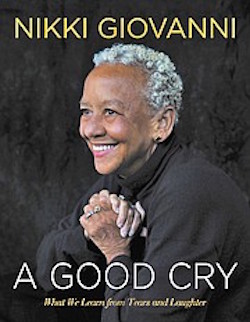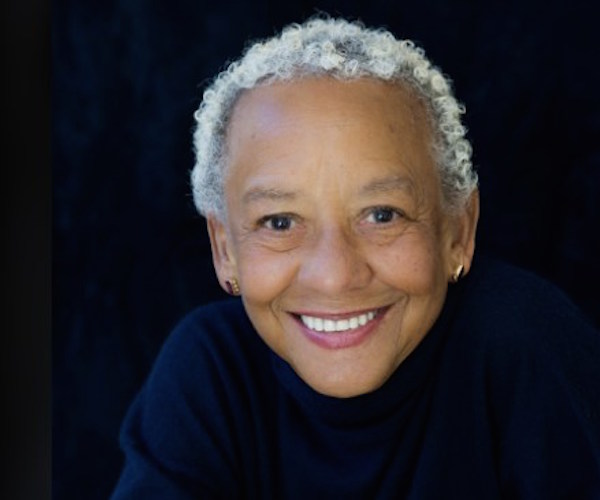Book Review: Nikki Giovanni — Still Feisty After All These Years
Reading Nikki Giovanni, one is inspired to never cower, to never beg, to never surrender.
A Good Cry: What We Learn from Tears and Laughter by Nikki Giovanni, William Morrow, 128 pages, $19.99.
By Robert Israel
Flashback, circa 1980s:
I’m on a field trip from Roxbury to Beacon Hill with students from my high school English class. They call me “Teach.” Several of my students confess that they earn cash by working as lookouts at “shooting galleries” on Boston’s Blue Hill Avenue. Bankrolled by drug pushers, the kids alert addicts, mainlining heroin in vacant apartments, if any Boston police are approaching.
“We make more money on the street than you do, Teach,” they say.
We arrive at Suffolk’s C. Walsh Theatre. African-American poet Nikki Giovanni reads from her poem “Ego- Tripping.” She urges us not to let our boastful selves get the best of us, to use our vitality for the collective good.
Returning to Roxbury, several students exclaim: “You know something, Teach? Nikki Giovanni — she’s really cool.”
Flash-forward, 2017:

Now 74 years old, a longtime professor of English at Virginia Tech, with over 27 books of poetry and prose to her credit, Nikki Giovanni remains “cool.”
Her new volume of poetry, A Good Cry: What We Learn from Tears and Laughter, draws on her life to lay bare the sorrows and joys of the human experience Her language is earthy, wise, and warm. There’s no gussied up iambs or flowery speech. Giovanni uses plain talk.
There is no central thread to the collection. With Giovanni, you get the myriad aspects of her life and meet various people she’s encountered along the way. She takes us on a meander, not a steeplechase.
She doesn’t flinch from describing abhorrent memories, such as witnessing her father beat her mother “every Saturday night.” Her mother concludes that she has only two choices: “Leave or kill him.” Giovanni acknowledges the influence of her grandmother, whom she adored, and the folks she knew in Cincinnati, Ohio, where she came of age. She registers the curse of poverty and describes her fight against racism. She insists that these challenges not drag down or muddy our spirits. She writes tributes to the late actress Ruby Dee, to her mentor/friend the late celebrated poet Maya Angelou, and to Big Maybelle, the famed blues shouter. A cancer survivor, Giovanni tells us about her illness and convalescence; she savors life with the gratitude of a survivor, thankful for her healers. She thanks a student who fetches her coffee from Starbucks during a snowstorm: she takes nothing, and no one, for granted.
Several of the poems exhibit a wry sense of humor: Giovanni muses about fancying a young man while an undergraduate at Fisk, comically dovetailing her appetite for food and his good looks. She also writes as an educator. It is in these poems that she brought me back to that long ago bus ride I took with my students from Blue Hill Avenue to see her read on Beacon Hill. In the poem, “The Tassel’s Worth the Hassle: An Introduction,” she questions the value of standardized education, and argues that schoolchildren might be better off if high school ended at the 10th grade. She advocates that an additional two years to be added on to the requirement for a baccalaureate degree. “Send the kids on to Community Service,” she writes. “Let them go abroad.”
The poem “Baby West” elaborates on the meaning of the book’s title; that we have to learn how to cleanse our spirits. “I am trying to learn how to cry,” Giovanni writes. “It is not that my life has been a lie/But that I repressed my tears.”
Giovanni has not repressed her activism. She’s gone from championing civil rights in the 1960s to leading a chant poem in homage to students gunned down during the recent rampage at Virginia Tech. A Good Cry suggests that underneath her commitment to community was a mission to achieve personhood — despite the odds: “Grandmother had to beg/ A White man to let me/enroll in Austin High,” she writes.
Reading Nikki Giovanni, one is inspired to never cower, to never beg, to never surrender.

Poet and activist Nikki Giovanni: Her language is earthy, wise, and warm.
Flash-forward, 2018:
Giovanni reads from A Good Cry: What We Learn from Tears and Laughter on February 2 at 7 p.m. at Brookline Booksmith.
Robert Israel writes about theater, travel, and the arts, and is a member of Independent Reviewers of New England (IRNE). He can be reached at risrael_97@yahoo.com.
